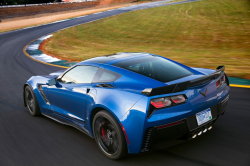
— Chevy Corvette Z06 overheating problems have caused another lawsuit that alleges the transmissions and rear differentials overheat and cause the cars to enter "limp mode," forcing the cars to drastically lose power and speed.
The proposed class-action lawsuit includes about 30,000 model year 2015-2017 Corvette Z06s that cost each owner anywhere from $80,000 to $120,000.
Multiple lead plaintiffs from various states claim the "track-ready" Z06 cars overheat in less than 15 minutes of racetrack driving because of defective cooling systems for the transmissions and rear differentials.
To handle the stress and loads of driving on a track, the cars are equipped with special suspensions, special steering systems, special brakes and specific software settings, including a “Track App” and a heads-up tachometer display used for racing.
Colorado plaintiff Michael Matanky says he purchased a new 2016 Chevrolet Corvette Z06 LT3 for about $106,000, believing the car was ready for normal highway and racetrack driving.
Matanky claims he was driving his car uphill on a hot day in the summer of 2016 when the Z06 overheated and went into limp mode, leaving him in fear of trying to drive the car on a racetrack. The plaintiff says because GM concealed the cooling system problems, he paid for something that cannot be used for its intended purposes.
In January 2018, Mr. Matanky says he attended a classic car auto auction in Arizona where General Motors had a large exhibit of new Chevy cars, including the new Corvette ZR1. Mr. Matanky says he noticed the 2018 ZR1 with a Corvette body that appeared to have a completely redesigned front with several new large cutout openings and new large coolers mounted in the openings.
The plaintiff says he talked with GM representatives who were showing the new 2018 ZR1. The GM reps allegedly admitted to Mr. Matanky they wished they had more time to design the Corvette body so the cooling problems with the original Corvette Z06s would not have occurred.
Matanky claims he told them he was unhappy about the way his 2016 Corvette Z06 performs because of the cooling issues, but GM's people allegedly just smiled and shrugged their shoulders.
According to the lawsuit, the transmission system for a “track-proven” Z06 must come equipped with transmission coolers to cope with the high engine speeds and fast frequent gear shifts.
Without the coolers, the transmissions will allegedly cause the car to go into limp mode to prevent damage from overheating. In addition to the transmission, the plaintiff says a rear differential needs a specialized cooler to give a car the required traction for race driving.
The lawsuit says driving the cars is dangerous to the drivers and others when the cars enter limp mode, suddenly causing the cars to slow to a crawl. This condition occurring on a busy highway is dangerous enough, but the plaintiffs say limp mode on a racetrack can cause serious carnage because of other cars traveling at high speeds on the track.
General Motors has allegedly advertised the Z06 cars as fully track-capable while knowing the lack of transmission coolers make the task impossible because of overheating problems.
A similar lawsuit was filed against GM in 2017 that claims the automaker allegedly fixed the problem in the 2017 Corvette Z06 by switching to a new hood with larger vents and new supercharger covers. However, the plaintiffs claim the fix did nothing to prevent overheating in 2017 models or previous model year cars.
The previous lawsuit was partially dismissed on January 16, 2018, when the judge dismissed (with prejudice) claims against GM for unjust enrichment and fraudulent concealment, but allowed the lawsuit to proceed based on three other claims.
Separately, the Chevy Corvette Z06 was named in a 2015 lawsuit that alleges the cars have problems with excessive wear of the valve guides that can cause engines to failure.
The Chevrolet Corvette Z06 overheating lawsuit was filed in the U.S. District Court for the Eastern District of Michigan - Matanky et al v. General Motors LLC.
The plaintiffs are represented by Hagens Berman, Grossman Roth Yaffa Cohen, the Miller Law Firm, and Schuler Halvorson Weisser Zoller Overbeck.




